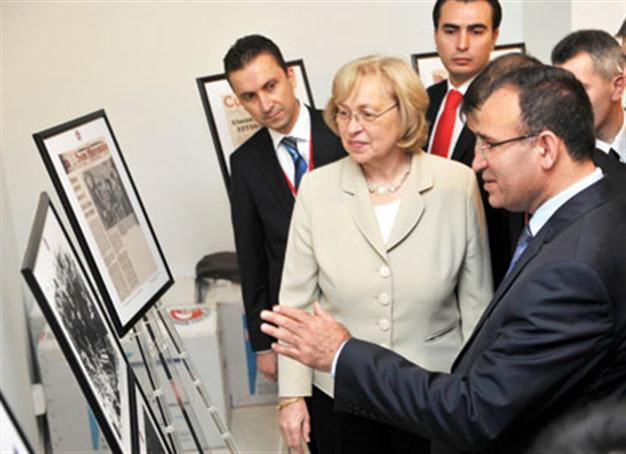
Deputy PM Bekir Bozdağ (R) visits an exhibition in Berlin that brings together newspaper stories on immigration to Germany. AA photo
Millions of Turks living abroad may be able to cast their votes from outside the country in the next presidential and general elections, a senior Cabinet minister said Oct. 31.
“A draft has been opened for signature at the Cabinet level. I believe Parliament will give priority to this after the completion of budget talks,” Deputy Prime Minister Bekir Bozdağ told a group of reporters late Monday in Berlin on the sidelines of the celebration of the 50th year of the Turkish-German labor recruitment agreement. The proposed referendum would deeply impact Turks living in Germany, a country that is home to more than 2.5 million Turks today.
“Our citizens in every corner of the world will be able to cast their votes without any problem afterward,” Bozdağ said. Turkish consulates in every country will be able to set ballot boxes nearly four weeks before the election date in which citizens will be able to vote for the political parties or for the popular elections.
The first votes Turks abroad may be able to cast will be for the presidential election in 2014. Necessary arrangements will be carried out by the Supreme Election Board (YSK) and the Foreign Ministry.
Bozdağ said he estimated that nearly 95 percent of Turks living in Germany would vote for the ruling Justice and Development Party (AKP).
The Constitutional Court had annulled an earlier law allowing Turks living abroad to vote via mail or electronic means, a move that soiled the AKP’s plans to allow Turks living abroad to vote for the first time in the June 12 general election. Despite the German government’s green light to allow consulates to set ballot boxes, the YSK opposed the idea, claiming there was no time to make arrangements.
Among the 6.5 million Turks living abroad, nearly half are eligible to vote, according to estimates, which would have an important effect on election results. One seat of the opposition parties of Parliament had been transferred to the ruling party after the addition of the votes cast on the Turkish border by Turks living abroad in the June 12 elections.
PKK growing problem in Germany
Active Kurdistan Workers’ Party (PKK) members can be found in Germany. “There were twice as many PKK and DHKP-C [Revolutionary People’s Liberation Party-Front] members in Germany than in the Kandil Mountains in northern Iraq, which is home to nearly 5,000 PKK terrorists,” said Parliament Speaker Cemil Çiçek.
Deputy Prime Minister Bozdağ complained about PKK protests in Germany. “On the day when we inaugurated an exhibition for the 50th year of [Turkish-German labor recruitment agreement] in the Munich Train Station, a group of PKK members was holding a protest against us only 200 meters away.”
For Germany, however, this is simply an exercise of the fundamental right to assemble and march and a consequence of Turkey’s restrictions on Kurds to do the same in Turkey, he said.
“In Turkey, everyone can freely assembly and hold a protest meeting. This is under the protection of the Constitution,” Bozdağ said. “But the main problem is that German officials still do not consider the PKK as a terror organization but a criminal gang despite the European Union’s decision in 2006.”
Bozdağ said numerous groups close to the PKK were active in Germany under the auspices of cultural associations. “If they would consider the PKK as a terrorist organization, I believe they would impose harsher sanctions upon it.”